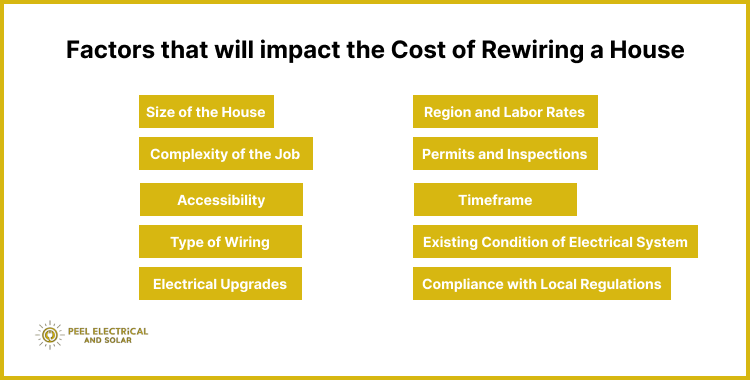What is House Rewiring?
House rewiring is the process of replacing the existing electrical wiring in a home to ensure it meets current safety standards, improves electrical performance, and accommodates modern appliances and technology. This involves removing outdated or damaged wiring, installing new wires, outlets, switches, and circuit breakers, and ensuring the entire electrical system is safe and compliant with local regulations.
Cost of Rewiring a house
In Australia, the average cost to rewire a house is $40 per hour for a licensed electrician. For more complex jobs with accessibility challenges and additional factors, the cost can rise to $65 – $70 per hour.
The hourly rate for an electrician can vary based on your location. Below is a list of the average hourly rates for electricians in major cities and states across Australia.
| City | Average Cost Per Hour |
|---|---|
| Adelaide | $40/hr |
| Brisbane | $35/hr |
| Canberra | $40/hr |
| Darwin | $35/hr |
| Hobart | $30/hr |
| Melbourne | $30/hr |
| Perth | $55/hr |
| Sydney | $35/hr |
| State | Average Cost Per Hour |
|---|---|
| New South Wales | $40/hr |
| South Australia | $40/hr |
| Tasmania | $50/hr |
| Victoria | $40/hr |
| Western Australia | $50/hr |
| Queensland | $40/hr |
Average Rewiring costs for 2, 3 and 4 bedroom house
Average rewiring cost for 2, 3 and 4 bedrooms houses in Australia are below:
2 bedroom house rewire cost: $1,500 – $5,000
3 Bedroom house rewire cost: $3,000 – $10,000
4 bedroom house rewire cost: $10,000 – $12,000
Average Cost of Rewiring an old house
The average cost of rewiring a house in Australia is between $3,000 to $15,000 AUD. This cost can vary based on the size of the house, the complexity of the job, accessibility issues, and the rates charged by licensed electricians in different regions.
Factors that will impact the Cost of Rewiring a House

Size of the House: Larger homes require more materials and labor, increasing the overall cost.
Complexity of the Job: Older homes or those with complex wiring systems may need more time and expertise to rewire.
Accessibility: If the wiring is difficult to access, such as in tight spaces or behind walls, it will take more time and effort, raising the cost.
Type of Wiring: The type and quality of wiring materials used can affect the cost. Higher-quality materials may be more expensive but offer better performance and safety.
Electrical Upgrades: Additional upgrades like adding extra outlets, switches, or modernizing the electrical panel will increase the total cost.
Region and Labor Rates: Labor rates for electricians vary by region. Areas with a higher cost of living will generally have higher labor rates.
Permits and Inspections: Obtaining the necessary permits and undergoing inspections can add to the overall cost.
Timeframe: Urgent projects requiring fast completion may incur additional charges.
Existing Condition of Electrical System: Homes with severely outdated or damaged wiring will require more work, thus increasing costs.
Compliance with Local Regulations: Ensuring the wiring meets local building codes and regulations might necessitate additional work or materials.
When Does a House Need Rewiring?
Many homes, particularly those built before the 1960s, may have outdated electrical wiring that can’t handle the demands of modern appliances and electronics.
Here are some warning signs that might indicate your home needs rewiring:
Flickering or dimming lights: This can be caused by loose connections, overloaded circuits, or outdated wiring.
Frequent tripping of circuit breakers: If your circuit breakers trip frequently, it’s a sign that your circuits are overloaded and may not be able to handle the current draw.
Warm outlets or switches: Electrical outlets and switches should never feel warm to the touch. This could indicate overheating due to loose connections or overloaded circuits.
Visible damage to wiring: If you see any exposed or frayed wiring in your home, it’s a serious safety hazard and needs immediate attention from a qualified electrician.
Outdated features: Homes with knob-and-tube wiring, a system used before the 1950s, should be rewired with modern wiring materials.
Increased reliance on extension cords: Having to rely on extension cords to power appliances is a sign that your existing outlets can’t handle the demand.
Electrical Shocks: Any instances of electrical shocks when using appliances or outlets should prompt immediate investigation and potential rewiring.
How Long Does It Take to Rewire a house?
On average, here are some general time estimates of How Long Does It Take to Rewire a house:
Small House (1-2 bedrooms): 3-5 days
Medium House (3-4 bedrooms): 5-7 days
Large House (5+ bedrooms): 7-10 days or more
The time it takes to rewire a house can vary widely based on several factors, including the size of the house, the complexity of the job, and the accessibility of the wiring.
How Often Should a House be Rewired?
A house should generally be rewired every 20 to 30 years to ensure the electrical system remains safe and capable of handling modern electrical demands. But you should have an inspection every 5-10 years.
However, certain factors may necessitate more frequent rewiring:
Age of Wiring: Homes built before the 1960s with outdated wiring like knob-and-tube or aluminum wiring may require immediate attention.
Signs of Wear: Frequent blown fuses, tripped circuit breakers, flickering lights, or discolored outlets can indicate wiring issues.
Renovations or Upgrades: Significant home renovations or adding new electrical appliances may require an upgrade to the existing electrical system.
The Benefits of Rewiring a House
Investing in house rewiring offers a multitude of benefits for your home and family:
Improved safety: Modern wiring materials and proper installation significantly reduce the risk of electrical fires and shocks.
Enhanced peace of mind: Knowing your electrical system is up-to-date and meets current safety standards provides peace of mind.
Increased home value: A modern electrical system can add value to your property, especially when selling.
Improved functionality: Rewiring ensures your home can support the increased electrical demands of modern appliances, electronics, and potential future upgrades.
Reduced energy consumption: Modern wiring materials can improve the efficiency of your electrical system, potentially leading to lower energy bills.
What Does House Rewiring Involve?
House rewiring is a complex project that should only be undertaken by a licensed and experienced electrician. Here’s a general overview of the process:
Initial assessment: A qualified electrician will visit your home to inspect your existing wiring system, discuss your needs and concerns, and provide an estimate.
Planning and permitting: The electrician will develop a detailed rewiring plan and obtain any necessary permits from your local council.
Safe disconnection of power: The safety of everyone involved is paramount. The electrician will ensure the power is safely disconnected before any rewiring work begins.
Removal of old wiring: Outdated and potentially unsafe wiring will be carefully removed from your walls and ceilings.
Installation of new wiring: New electrical cables and components that meet current safety standards will be installed throughout your home.
Testing and inspection: The new wiring system will be thoroughly tested for functionality and safety by a qualified technician.
Restoration and cleanup: Once the rewiring is complete, the electrician will restore any walls and ceilings that were disturbed during the process, and leave your home clean and tidy.
Choosing a House Rewiring Contractor
Credentials and Experience: Selecting a licensed and experienced electrical contractor ensures quality workmanship and adherence to safety standards.
References and Reviews: Researching and selecting reputable contractors based on references, reviews, and testimonials helps ensure satisfaction with the quality of work.
Customized Solutions: Choosing a contractor who offers customized solutions tailored to the homeowner’s specific needs and budget is essential.
